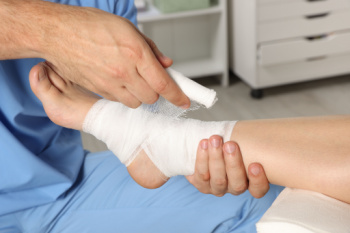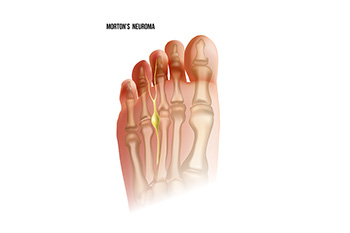Items filtered by date: September 2024
Gout Pain Can Be Managed
What to Do if Your Child Complains of Heel Pain

Heel pain in children is often caused by repetitive stress or overuse, similar to adults. A common cause is plantar fasciitis, which occurs when the thick band of tissue along the bottom of the foot becomes inflamed due to excessive strain. Other potential causes include Sever's disease, Achilles tendonitis, or poorly fitting shoes that lack proper support. The first thing to do to address heel pain is to have the child rest and reduce activities, like running or jumping that might worsen the condition. Ensure your child wears well-fitted shoes with good arch support and cushioning. If the heel pain persists or worsens, it is suggested that you schedule an appointment with a podiatrist to rule out more serious conditions and explore treatments such as orthotics, targeted exercises, or other interventions. Just as with adults, early treatment is essential to prevent long-term foot issues in children.
Many people suffer from bouts of heel pain. For more information, contact Brandon M. Zuklie, DPM of New Jersey. Our doctor can provide the care you need to keep you pain-free and on your feet.
Causes of Heel Pain
Heel pain is often associated with plantar fasciitis. The plantar fascia is a band of tissues that extends along the bottom of the foot. A rip or tear in this ligament can cause inflammation of the tissue.
Achilles tendonitis is another cause of heel pain. Inflammation of the Achilles tendon will cause pain from fractures and muscle tearing. Lack of flexibility is also another symptom.
Heel spurs are another cause of pain. When the tissues of the plantar fascia undergo a great deal of stress, it can lead to ligament separation from the heel bone, causing heel spurs.
Why Might Heel Pain Occur?
- Wearing ill-fitting shoes
- Wearing non-supportive shoes
- Weight change
- Excessive running
Treatments
Heel pain should be treated as soon as possible for immediate results. Keeping your feet in a stress-free environment will help. If you suffer from Achilles tendonitis or plantar fasciitis, applying ice will reduce the swelling. Stretching before an exercise like running will help the muscles. Using all these tips will help make heel pain a condition of the past.
If you have any questions please contact our offices located in Piscataway, Jamesburg, and Branchburg, NJ . We offer the newest diagnostic and treatment technologies for all your foot and ankle needs.
Negative Pressure Therapy for Diabetic Foot Wounds

Negative pressure therapy, or vacuum-assisted closure, is an effective treatment for diabetic foot wounds, promoting faster healing and reducing complications. This method involves applying a controlled negative pressure to the wound through a sealed dressing connected to a vacuum pump. This pressure helps to remove excess fluid, reduce swelling, and enhance blood flow to the area, which accelerates tissue repair. Additionally, this type of therapy helps to draw the wound edges together, facilitating faster closure and reducing the risk of infection. For diabetic patients, who often face challenges with wound healing due to compromised circulation and neuropathy, negative pressure therapy can be a game-changer. If you have a diabetic foot wound, it is strongly suggested that you schedule an appointment with a podiatrist to determine if this therapy is suitable for your specific wound.
Wound care is an important part in dealing with diabetes. If you have diabetes and a foot wound or would like more information about wound care for diabetics, consult with Brandon M. Zuklie, DPM from New Jersey. Our doctor will assess your condition and provide you with quality foot and ankle treatment.
What Is Wound Care?
Wound care is the practice of taking proper care of a wound. This can range from the smallest to the largest of wounds. While everyone can benefit from proper wound care, it is much more important for diabetics. Diabetics often suffer from poor blood circulation which causes wounds to heal much slower than they would in a non-diabetic.
What Is the Importance of Wound Care?
While it may not seem apparent with small ulcers on the foot, for diabetics, any size ulcer can become infected. Diabetics often also suffer from neuropathy, or nerve loss. This means they might not even feel when they have an ulcer on their foot. If the wound becomes severely infected, amputation may be necessary. Therefore, it is of the upmost importance to properly care for any and all foot wounds.
How to Care for Wounds
The best way to care for foot wounds is to prevent them. For diabetics, this means daily inspections of the feet for any signs of abnormalities or ulcers. It is also recommended to see a podiatrist several times a year for a foot inspection. If you do have an ulcer, run the wound under water to clear dirt from the wound; then apply antibiotic ointment to the wound and cover with a bandage. Bandages should be changed daily and keeping pressure off the wound is smart. It is advised to see a podiatrist, who can keep an eye on it.
If you have any questions, please feel free to contact our offices located in Piscataway, Jamesburg, and Branchburg, NJ . We offer the newest diagnostic and treatment technologies for all your foot care needs.
Facts About Hammertoe Surgery

Hammertoe surgery addresses the deformity where one or more toes bend downward, resembling a hammer. This procedure aims to relieve pain, improve function, and restore normal toe alignment. There are several types of hammertoe surgery, each tailored to the severity and specifics of the condition. Tendon transfer involves repositioning tendons to correct the toe's alignment. Joint resection, or arthroplasty, removes a portion of the joint to alleviate pressure and pain. Fusion, or arthrodesis, involves joining the bones in the affected joint to provide stability and straighten the toe permanently. Post-surgery, expect a period of recovery that includes swelling, pain management, and restricted movement. Wearing supportive footwear and following post-operative care instructions are essential for optimal healing and achieving the best results from the surgery. If you have a hammertoe that is causing you pain and discomfort, it is suggested that you consult a podiatrist who can determine if surgery is right for you.
Foot surgery is sometimes necessary to treat a foot ailment. To learn more, contact Brandon M. Zuklie, DPM of New Jersey. Our doctor will assist you with all of your foot and ankle needs.
When Is Surgery Necessary?
Foot and ankle surgery is generally reserved for cases in which less invasive, conservative procedures have failed to alleviate the problem. Some of the cases in which surgery may be necessary include:
- Removing foot deformities like bunions and bone spurs
- Severe arthritis that has caused bone issues
- Cosmetic reconstruction
What Types of Surgery Are There?
The type of surgery you receive will depend on the nature of the problem you have. Some of the possible surgeries include:
- Bunionectomy for painful bunions
- Surgical fusion for realignment of bones
- Neuropathy decompression surgery to treat nerve damage
Benefits of Surgery
Although surgery is usually a last resort, it can provide more complete pain relief compared to non-surgical methods and may allow you to finally resume full activity.
Surgical techniques have also become increasingly sophisticated. Techniques like endoscopic surgery allow for smaller incisions and faster recovery times.
If you have any questions please feel free to contact our offices located in Piscataway, Jamesburg, and Branchburg, NJ . We offer the newest diagnostic and treatment technologies for all your foot and ankle needs.
Morton’s Neuroma Facts

Morton’s neuroma is a painful condition affecting the foot, typically caused by a thickening of the tissue around one of the nerves leading to the toes. This condition often develops between the third and fourth toes, where the nerve becomes compressed or irritated. Morton’s neuroma can be triggered by factors such as wearing tight or high-heeled shoes, which place excessive pressure on the foot, or by repetitive stress from activities like running or jumping. Symptoms can include sharp, burning pain in the ball of the foot, tingling or numbness in the toes, and a feeling of having a pebble in the shoe. These symptoms often worsen with activity and improve with rest. If you have pain in this area of your foot, it is suggested that you contact a podiatrist who can accurately diagnose and treat Morton’s neuroma.
Morton’s neuroma is a very uncomfortable condition to live with. If you think you have Morton’s neuroma, contact Brandon M. Zuklie, DPM of New Jersey. Our doctor will attend to all of your foot care needs and answer any of your related questions.
Morton’s Neuroma
Morton's neuroma is a painful foot condition that commonly affects the areas between the second and third or third and fourth toe, although other areas of the foot are also susceptible. Morton’s neuroma is caused by an inflamed nerve in the foot that is being squeezed and aggravated by surrounding bones.
What Increases the Chances of Having Morton’s Neuroma?
- Ill-fitting high heels or shoes that add pressure to the toe or foot
- Jogging, running or any sport that involves constant impact to the foot
- Flat feet, bunions, and any other foot deformities
Morton’s neuroma is a very treatable condition. Orthotics and shoe inserts can often be used to alleviate the pain on the forefront of the feet. In more severe cases, corticosteroids can also be prescribed. In order to figure out the best treatment for your neuroma, it’s recommended to seek the care of a podiatrist who can diagnose your condition and provide different treatment options.
If you have any questions, please feel free to contact our offices located in Piscataway, Jamesburg, and Branchburg, NJ . We offer the newest diagnostic and treatment technologies for all your foot care needs.

